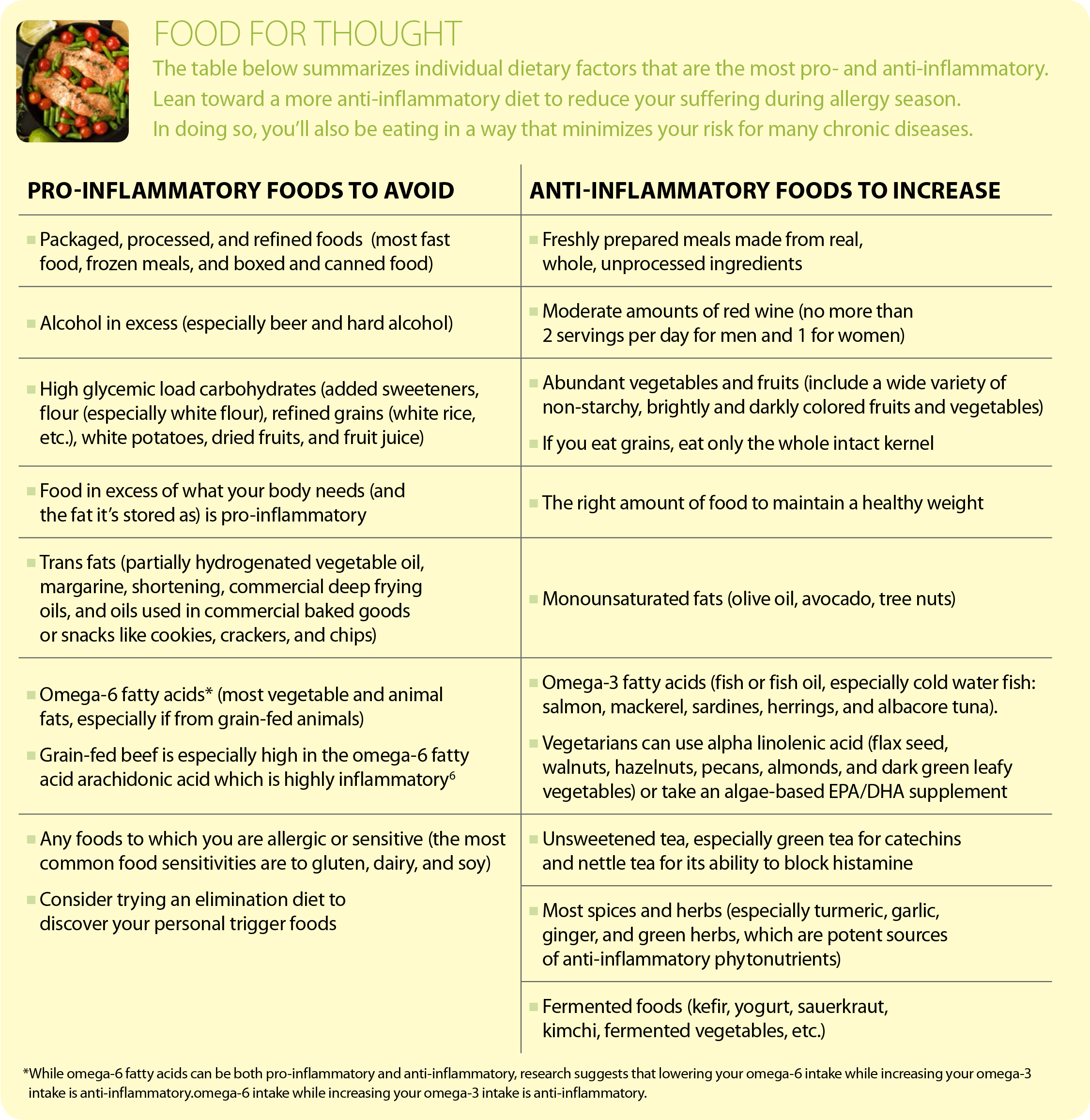Seasonal Allergies: How to Fight Them With Food
Believe it or not, even seasonal allergies can be substantially reduced by making dietary and lifestyle changes.
Spring arrived early this year in my hometown, and so did allergy season. The sounds of sneezing and sniffling are everywhere, and allergy medicines are flying off the drugstore shelves. Fortunately, I no longer suffer from seasonal allergies as an adult the way I did as a child, and even then, my symptoms were never so severe that they kept me home from school or other activities. In contrast, many people with seasonal allergies experience a substantial burden on their sleep, quality of life, cognitive function, and school/workplace productivity, even with treatment.[1]
It Doesn’t Have to be This Way
Believe it or not, even seasonal allergy symptoms can be substantially reduced by making dietary and lifestyle changes. The key to natural allergy relief is to eat and live a more anti-inflammatory lifestyle. The results won’t be immediate and you may still need medication to manage acute symptoms some days, but practitioners of natural medicine have long treated allergies of all kinds, including seasonal allergies, with anti-inflammatory diet and lifestyle therapies, with great results.
About Allergic Rhinitis
Also known as hay fever, allergic rhinitis literally means “inflammation of the nose caused by allergies.” Some people suffer from year-round allergic rhinitis due to allergies to mold, dust mites, pets, etc. Others suffer during allergy season only (which can last half the year), because of pollen allergies to trees, grasses, and weeds. Sadly, 40% of people with allergic rhinitis have both seasonal and perennial allergies.[2]
The early symptoms of allergic rhinitis include nasal congestion, runny nose (including post-nasal drip), sneezing, and itchy nose. Eye symptoms, such as itchiness, redness, burning, and tearing, are also common. These initial symptoms usually occur within minutes of allergen exposure. Hours later, in addition to congestion, symptoms including fatigue, malaise, irritability, and cognitive impairment can also occur.[3]
Inflammation & Seasonal Allergies
Like many other chronic diseases, allergic rhinitis is an inflammatory disease. Some of the inflammation stays within the airways, but pro-inflammatory molecules also travel through the bloodstream and infiltrate other parts of the body.[4]
Allergy symptoms are initially triggered because of inflammatory compounds that are released when mucous membranes are exposed to allergens (certain foreign proteins to which the immune system has become sensitized). Within the airways, inflammatory compounds stimulate the mucous glands to increase secretions. They also dilate the blood vessels and increase their permeability, which leads to increased swelling, congestion, and pressure. Over 4 to 8 hours, these inflammatory compounds recruit additional inflammatory immune cells, resulting in continued inflammation within the nose and throughout the body.[3]
Many of the most effective natural therapies for seasonal allergies are directed at this underlying inflammation and its body-wide manifestations. This is quite unlike most of the commonly used conventional treatments (such as antihistamines and steroid nasal sprays), which block symptoms and/or inhibit a single inflammatory compound or class of compounds.

Anti-Inflammatory Diets for Seasonal Allergies
Diet, in particular, has powerful effects on inflammation. Some dietary factors have been found to be pro-inflammatory, while others have anti-inflammatory effects and still others have both, but tend to lean more in one direction or another.
Western-style diets, which are high in red meat, high-fat dairy products, refined grains, and simple carbohydrates, have been associated with higher levels of inflammation in numerous studies.[5] On the other hand, Mediterranean-style diets, which are high in fish, fruits, vegetables, and whole grains, and associated with moderate alcohol and olive oil intake and low intake of red meat and butter, have been associated with lower levels of inflammation.[5] Specific nutrients such as omega-3 fatty acids, fiber, and numerous phytochemicals, such as flavonoids and carotenoids, are also associated with lower inflammation levels.
Addressing the causes of inflammation and learning how to live an anti-inflammatory lifestyle can lead you to a state of freedom from allergies that you never thought possible. These anti-inflammatory diet suggestions are key to an anti-inflammatory lifestyle, allergy control, and a state of vitality. In addition to poor diet, the other most common lifestyle-related causes of inflammation are lack of exercise, lack of adequate sleep, and stress. The more you can get regular physical activity, a good night’s sleep, and relaxation, the less inflammatory conditions like allergies will bother you. Don’t underestimate the power of these basic natural therapies when it comes to your allergies.
For related reading, visit these posts:
- The Myth of Non-Drowsy Allergy Medication
- Cold vs. Allergies: What’s the Difference?
- Confronting Your Nasal Allergies
- Anti-Inflammatory Foods: Do They Work?
This article was originally published in 2016. It is regularly updated.
1. Allergy Asthma Proc. 2009 May-Jun;30(3):244-54.
2. J Allergy Clin Immunol. 2001 Jul;108(1 Suppl):S2-8.
3. Curr Opin Allergy Clin Immunol. 2004; 4(3):159-63.
4. J Allergy Clin Immunol. 2003 Dec;112(6):1021-31.
5. J Nutr. 2009 Dec; 139(12): 2365–2372.
6. Eur J Pharmacol. 2011 Sep;668 Suppl 1:S50-8.


 Hearing Aids Extend Longevity
Hearing Aids Extend Longevity  How to Fix a Droopy Eyelid
How to Fix a Droopy Eyelid  Droopy Eyelids Can Interfere with Vision
Droopy Eyelids Can Interfere with Vision 
Results of a recently published study show higher intake of food-based vitamin D by expectant mothers reduces the risk of childhood allergic rhinitis.
© Catalina Zaharescu Tiensuu